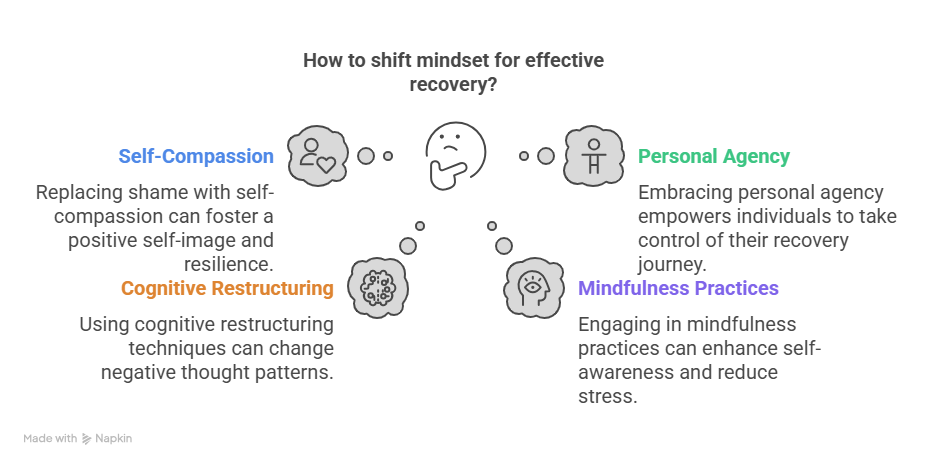Overcoming fentanyl addiction requires more than just medical treatment; it demands a fundamental shift in one’s mindset. Recovery is a journey that involves understanding the complexities of addiction and adopting a resilient and positive outlook.
Changing your mindset is crucial in breaking the cycle of addiction. It empowers individuals to confront their struggles, develop coping strategies, and foster a supportive environment conducive to long-term recovery.
By focusing on the psychological aspects of recovery, individuals can better navigate the challenges of overcoming fentanyl addiction. A positive mindset not only aids in recovery but also enhances overall well-being.
Key Takeaways
- Understanding the importance of mindset in recovery
- Adopting a positive and resilient outlook
- Developing coping strategies for long-term recovery
- Fostering a supportive environment
- Navigating the challenges of overcoming addiction
The Reality of Fentanyl Addiction in America
Fentanyl, a synthetic opioid, has emerged as a major contributor to the rising tide of addiction and overdose deaths in the United States. The deadly potency of fentanyl, which is significantly higher than heroin or morphine, makes it particularly dangerous.
The impact of fentanyl addiction is felt across various demographics, with overdose rates continuing to rise. According to recent statistics, fentanyl is involved in the majority of opioid-related overdose deaths.
Understanding the Deadly Nature of Fentanyl
Fentanyl’s potency is 50 to 100 times greater than morphine, making even small amounts potentially lethal. This high potency increases the risk of overdose, especially when individuals are unaware that their drugs are laced with fentanyl.
Why Traditional Recovery Methods Often Fall Short
Traditional recovery methods often focus on medication-assisted treatment and counseling. However, these methods may not be sufficient for everyone, particularly those struggling with the complex psychological aspects of fentanyl addiction.
| Recovery Method | Success Rate | Challenges |
|---|---|---|
| Medication-Assisted Treatment | Moderate | Potential for dependency on medication |
| Cognitive Behavioral Therapy | High | Requires commitment and motivation |
| Support Groups | High | May not be effective for everyone |
The Critical Role of Fentanyl Addiction Mindset
A critical aspect of overcoming fentanyl addiction lies in understanding its psychological impact. Fentanyl addiction affects not just the body but also the mind, altering thinking patterns and emotional responses.
How Addiction Hijacks Your Thinking Patterns
Fentanyl addiction can rewire the brain, leading to compulsive drug-seeking behavior. This rewiring affects decision-making and emotional regulation, making it difficult for individuals to control their actions. The mindset shift in fentanyl addiction involves recognizing these changes and learning to manage them.
Why Mindset Transformation Is Essential for Recovery
Transforming one’s mindset is crucial for recovery. By changing negative thought patterns and developing healthier coping mechanisms, individuals can overcome the psychological grip of fentanyl addiction. This process involves cultivating self-compassion, resilience, and a supportive environment. A transformed mindset empowers individuals to make lasting changes, supporting long-term recovery and overall well-being.
Essential Mindset Shifts for Overcoming Fentanyl Addiction
To successfully overcome fentanyl addiction, individuals must be willing to make essential mindset shifts. These changes in perspective and approach are crucial for breaking free from the cycle of addiction.
Replacing Shame with Self-Compassion
One of the most significant mindset shifts is replacing shame with self-compassion. Individuals struggling with fentanyl addiction often carry a heavy burden of guilt and shame, which can hinder their recovery. Practicing self-compassion allows them to acknowledge their struggles without judgment, fostering a more positive and resilient mindset.
For instance, instead of dwelling on past mistakes, individuals can focus on their strengths and the steps they’re taking towards recovery. This shift in perspective can be incredibly empowering.
Moving from Helplessness to Personal Agency
Another critical mindset shift involves moving from helplessness to personal agency. By taking control of their recovery, individuals can begin to see themselves as capable and empowered, rather than as victims of their addiction. This change in mindset can be achieved by setting achievable goals and celebrating small victories along the way.
| Mindset Shift | Benefits |
|---|---|
| Replacing Shame with Self-Compassion | Reduces guilt, fosters positivity |
| Moving from Helplessness to Personal Agency | Empowers individuals, promotes self-control |
| Embracing Connection Instead of Isolation | Builds support networks, reduces feelings of loneliness |
Embracing Connection Instead of Isolation
Embracing connection instead of isolation is also vital. Fentanyl addiction can lead to social isolation, which in turn can exacerbate the problem. By seeking out supportive communities and building strong relationships, individuals can create a network that supports their recovery.
These mindset shifts are not easy to achieve, but they are essential for overcoming fentanyl addiction. By adopting a more compassionate, empowered, and connected mindset, individuals can significantly improve their chances of successful recovery.
Practical Mental Strategies for Breaking Free
Breaking free from fentanyl addiction requires more than just physical recovery; it demands a mental transformation. Effective recovery involves adopting strategies that address the psychological aspects of addiction.
Cognitive Restructuring Techniques
Cognitive restructuring is a powerful tool in combating fentanyl addiction. It involves identifying and challenging negative thought patterns that contribute to addiction.
Identifying and Challenging Addiction Thoughts
The first step in cognitive restructuring is to become aware of the thoughts that drive addictive behavior. By recognizing these thoughts, individuals can begin to challenge their validity and replace them with more constructive ones.
Creating New Mental Pathways
Creating new mental pathways involves replacing old, harmful thought patterns with new, healthier ones. This process helps individuals develop more positive coping mechanisms and improves their ability to manage cravings.
Mindfulness Practices for Managing Cravings
Mindfulness practices are essential for managing cravings and supporting long-term recovery from fentanyl addiction. These practices help individuals stay present and focused, reducing the intensity of cravings.
By incorporating mindfulness into their daily routine, individuals can better navigate the challenges of recovery and maintain their progress.
Professional Support for Mindset Transformation
Fentanyl addiction recovery requires a comprehensive approach, including professional support for mindset transformation. Changing one’s mindset is crucial in overcoming addiction, and seeking help from professionals can significantly enhance the recovery process.
Professional support comes in various forms, tailored to address the specific needs of individuals struggling with fentanyl addiction.
Therapy Options That Address Addiction Thinking
Therapy plays a vital role in addressing the thought patterns associated with fentanyl addiction. Cognitive-behavioral therapy (CBT) and contingency management are effective approaches that help individuals understand and change their addiction-related thought patterns.
Medication-Assisted Treatment and Mindset Work
Medication-assisted treatment (MAT) can be used in conjunction with therapy to support recovery. MAT helps manage withdrawal symptoms and cravings, making it easier for individuals to focus on changing their mindset.
| Therapy Approach | Description | Benefits |
|---|---|---|
| Cognitive-Behavioral Therapy (CBT) | Helps individuals identify and change negative thought patterns. | Enhances coping skills, reduces cravings. |
| Contingency Management | Uses positive reinforcement to encourage sobriety. | Motivates individuals to stay on track with recovery. |
| Medication-Assisted Treatment (MAT) | Manages withdrawal symptoms and cravings. | Reduces withdrawal discomfort, supports long-term recovery. |
Building Your Recovery Environment
Creating a supportive environment is crucial for overcoming fentanyl addiction. A positive and structured environment helps individuals stay focused on their recovery goals.
One of the key aspects of building a recovery environment is surrounding yourself with positive influences. This can include supportive family and friends, support groups, and positive role models. Positive influences can provide encouragement, motivation, and a sense of belonging, which are essential for long-term recovery.
Surrounding Yourself with Positive Influences
Surrounding yourself with positive influences involves identifying and engaging with people who support your recovery. This can be achieved by:
- Joining support groups where you can share your experiences and learn from others
- Reconnecting with family and friends who are supportive of your recovery
- Meeting new people through hobbies or activities that you enjoy
As the saying goes, “You are the average of the five people you spend the most time with.” Surrounding yourself with positive influences can significantly impact your recovery journey.
Creating Daily Routines That Support Sobriety
Creating daily routines is another critical aspect of building a recovery environment. A structured daily routine helps individuals stay on track and avoid triggers. This can include:
| Routine | Benefits |
|---|---|
| Morning meditation and exercise | Reduces stress and improves mental clarity |
| Regular meal times | Improves physical health and stability |
| Engaging in hobbies or creative activities | Provides a sense of purpose and fulfillment |
A well-structured daily routine can help individuals in recovery stay focused on their goals and maintain sobriety. As noted by a recovery expert,
“A daily routine that includes positive activities can significantly reduce the risk of relapse.”
Conclusion: Your Path to Lasting Freedom from Fentanyl
Overcoming fentanyl addiction is a journey that requires a comprehensive approach, with a critical component being a mindset shift. By understanding the reality of fentanyl addiction and the limitations of traditional recovery methods, individuals can begin to adopt effective fentanyl addiction recovery strategies. This includes replacing shame with self-compassion, embracing personal agency, and leveraging cognitive restructuring techniques and mindfulness practices.
A mindset shift in fentanyl addiction is not just about avoiding triggers but about transforming one’s thinking patterns. With the right professional support, including therapy options and medication-assisted treatment, individuals can build a robust recovery environment that fosters sobriety. Surrounding oneself with positive influences and creating daily routines that support recovery are crucial steps towards lasting freedom.

Recovery from fentanyl addiction is possible. By integrating the strategies discussed and maintaining a commitment to mindset transformation, individuals can achieve a life free from the grip of addiction. The path forward involves continued growth, support, and a steadfast dedication to sobriety.
FAQ
What is the first step in changing my mindset to overcome fentanyl addiction?
The first step is acknowledging the need for a mindset shift and being willing to confront the underlying issues driving your addiction. This involves recognizing the impact of fentanyl on your life and the lives of those around you, and seeking support from professionals or support groups.
How does fentanyl addiction affect my thinking patterns?
Fentanyl addiction can hijack your thinking patterns by creating a cycle of craving and obsession, making it difficult to focus on anything else. It can also lead to negative thought patterns, such as feelings of shame, guilt, and hopelessness, which can further entrench addiction.
What are some essential mindset shifts for overcoming fentanyl addiction?
Essential mindset shifts include replacing shame with self-compassion, moving from helplessness to personal agency, and embracing connection instead of isolation. These shifts can help you develop a more positive and empowered mindset, crucial for recovery.
How can cognitive restructuring techniques help in recovery?
Cognitive restructuring techniques, such as identifying and challenging negative thoughts and creating new mental pathways, can help you manage cravings and stay focused on recovery. These techniques can be learned through therapy or counseling.
What role does mindfulness play in managing fentanyl cravings?
Mindfulness practices, such as meditation and deep breathing, can help you manage cravings by teaching you to stay present and focused on the moment, rather than getting caught up in cravings or negative thoughts.
How can I build a supportive recovery environment?
Building a supportive recovery environment involves surrounding yourself with positive influences, such as supportive friends and family, and creating daily routines that support sobriety, such as regular exercise, healthy eating, and engaging in hobbies or activities you enjoy.
Is professional support necessary for overcoming fentanyl addiction?
Yes, professional support is often necessary for overcoming fentanyl addiction. Therapy options, such as cognitive-behavioral therapy, and medication-assisted treatment can provide the tools and support needed to manage cravings and stay on the path to recovery.
How long does it take to see progress in recovery?
The amount of time it takes to see progress in recovery varies from person to person. Recovery is a journey, and progress may be slow at times, but with the right mindset, support, and treatment, it is possible to achieve lasting freedom from fentanyl addiction.
Reference




